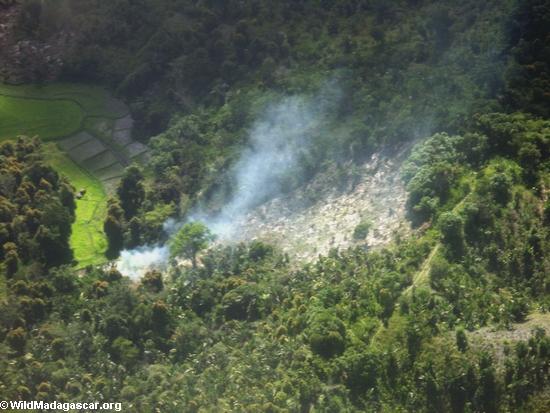Forest fires have serious economic, health, and environmental consequences warns FAO
FAO press release
September 5, 2005
 Fire is often used for clearing land for agriculture. As currently practiced, such burning is wasteful and inefficient. Valuable wood goes up in smoke. |
Large forest fires in South-East Asia, notably in Indonesia, have caused serious health and environmental problems, in particular choking haze in the region, FAO said today.
“Most of these fires are intentional and planned by agro-industrial companies to clear forests for agricultural land use,” said Mike Jurvelius, FAO forest fire expert.
“Using fire to clear forests is prohibited in most of the South-East Asian countries and the ban should urgently be enforced. Instead, tree and vegetation residues should be better utilized, or destroyed mechanically to protect human health and the environment,” Jurvelius said.
Related articles August 12, 2005 Plans to create the world’s largest palm oil plantation along Indonesia’s mountainous border with Malaysia could have a devastating impact on the forests, wildlife and indigenous people of Borneo, warns World Wildlife Fund. Haze in Malaysia worsens, may last until October August 11, 2005 Malaysia’s Prime Minister declared a state of emergency, closing ports and workplaces and calling on mosque-goers to pray for rain to clear the polluting haze coming from massive forest fires in nearby Indonesia. Meteorologists believe conditions are ripe for the haze to last well into October when rains are next expected. August 4, 2005 Forest fires in Indonesia’s Sumatra province covered Malaysia’s main city Kuala Lumpur and 32 other towns Tuesday with a smoky haze that reduced visibility to as low as one kilometer (half a mile). May 22, 2005 In the Indonesian subdistrict of Lamno on the island of Sumatra, rapid reconstruction from the December tsunami’s swath of destruction is taking place by several intrepid private organizations. The Aceh province was hit the hardest out of all the areas affected by the tsunami. At first glance, this efficient and speedy rebuilding of homes, schools, churches and fishing boats seems like nothing but a reassuring progression into recovery. Upon closer inspection however, it is becoming clear that despite the good intention of the relief groups coordinating these efforts, the response to one tragic disaster may only be facilitating another. April 26, 2005 Borneo, the third largest island in the world, was once covered with dense rainforests. With swampy coastal areas fringed with mangrove forests and a mountainous interior, much of the terrain was virtually impassable and unexplored. Headhunters ruled the remote parts of the island until a century ago. April 21, 2005 The tropical rainforests of Kalimantan have long been threatened and increasingly endangered by deforestation and other invasive types of human activity. However, a lesser known ecosystem in the region that is literally coming under fire, is the tropical peat lands, particularly in the central area of the province of Indonesian Borneo. In 1997 fires in these peat lands discharged 0.87 and 2.57 billion tons of carbon into the atmosphere. April 17, 2005 The southern half of Borneo contains some of the richest and most unique ecosystems on the planet. Indonesian Borneo, known as Kalimantan, is also one of the most environmentally threatened places on Earth. While many scientists have come to study this region, opportunities for observation are becoming increasingly scarce with the current perils facing the forests of Kalimantan. |
A cheap way
In South-East Asia, large-scale conversion of forests into agricultural land takes place mainly in flat areas with peat soils, the most productive land for agriculture. Land conversion is usually carried out by removing the trees and then burning the residues; a cheap way to clear land on a large scale.
A particular problem in the region is that large amounts of smoke result from fires burning as much as 20 meters down in the peat soils. These fires are almost impossible to extinguish, regardless of how many airplanes or helicopters are used. On a single hectare of land, up to 100 000 cubic meters of peat soil can burn.
“So long as people do not understand the dangers of using fires for land clearance on peat soils the fight against forest fires will be very costly and have only limited success,” Jurvelius added.
Don’t burn, use machines
The conversion of forests into agricultural land should follow established environmental practices, FAO said.
Instead of burning forest residues, machines could be used for chipping wood and using it for compost, while precious wood could be used for wood products. Mechanical clearing of forest residues is more expensive but more environmentally-friendly.
“There is a high demand for wood in the region; wood should therefore not be wasted or burned,” Jurvelius said.
In close collaboration with governments, FAO has started to prepare voluntary guidelines for fire management and the provision of financial resources for forestry agencies. Regional and sub-regional cooperation agreements on fire management have helped to reduce the impact of fires.
In the Eastern and Western Mediterranean region for example, countries have successfully cooperated across national borders in fire fighting. Five countries are currently assisting Portugal in extinguishing huge forest fires.
The text above includes a press release from the Food and Agriculture Organization of the United Nations (FAO).
Contact:
Erwin Northoff
News Coordinator
erwin.northoff(AT)fao.org
(+39) 06 570 53105
(+39) 348 25 23 616